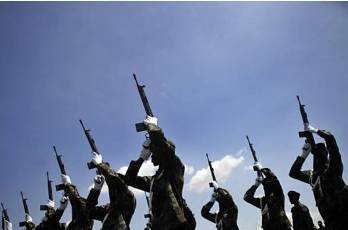S. Sudan accuses Sudan of amassing troops in Abyei region
February 10, 2013 (JUBA) – South Sudan on Sunday accused the Sudanese government of scaling up deployment of additional troops and massive settlement of Arabs nomads from the Misseriya tribe in the contested Abyei area, allegedly to sabotage the forthcoming referendum in the region.

“It is also against the spirit of dialogue. The agreement does not provide formation of such body. What is in the agreement is [an] inter-government task force,” said Deng.
He said the intention of the government of Sudan in forming the commission, which does not have any provisions, is solely to facilitate massive settlement of members of rival Arab nomads – the Misseriya.
“The government of Sudan has embarked on comprehensive massive settlement of the Misseriya in the area. They are also building up the number of their forces. They are scaling up development of more troops instead of withdrawing,” Deng told Sudan Tribune from Abyei town.
“This is a clear violation of the agreement which the [United Nations Interim Security Force for Abyei] UNISFA should be reporting. There is not any other better time than now. The people of Abyei have suffered a lot. It is time for the international community to give them [the] support they deserve”, he added.
Nearly 110,000 people were displaced when the Sudanese Armed Forces (SAF) took control of the disputed Abyei area in May 2011, ahead of South Sudan’s secession in July of the same year. The status of Abyei should have been decided in a referendum in January 2011 that year, but the two sides could not agree on the participation of Misseriya nomads in the vote.
In June 2011, South Sudan and Sudan sealed a deal providing to establish a temporary administration and legislative council, but Juba’s objection to the appointment of a Misseriya as the head of the local parliament delayed the process.
The latest African Union proposal on the matter suggests a vote in October 2013 that would not include members of the Misseriya because they do not reside permanently in the area.
South Sudanese president Salva Kiir accepted the African Union’s proposal last September, giving the green light for the implementation of the deal, renewing his commitment at a meeting held with his Sudanese counterpart, Omer Al-Bashir on 5 January this year.
RETURNEES FACE FOOD SHORTAGE
Meanwhile, Deng also called on humanitarian relief organisations, particularly those under the direct administrative command of the United Nations to change bureaucratic procedures and processes in order to avert the looming crisis facing returnees.
“People are returning. They are coming back. I met and held meetings with some of them on Friday when I came. They have been received by traditional leaders and assisted them to return to their original places but the biggest concern is that they have exhausted everything. They have run out of everything. They are now going for three weeks without food. Can you imagine?”
He said more than 1,500 people have returned home from Western Bahr el Ghazal state and more were expected in the course of coming days if transport is improved. The official said he had a meeting with heads of different relief organisations in Abyei and the agencies have promised to provide food and other assistance “very soon” but did not specify when.
“I held a meeting with [the] heads of the organisations here. I asked them to remedy the situation. The people are suffering. They accepted and said they will provide food very soon. They want to do [an] assessment. They need to verify and then make [a] report which is a long process”, he said.
(ST)
